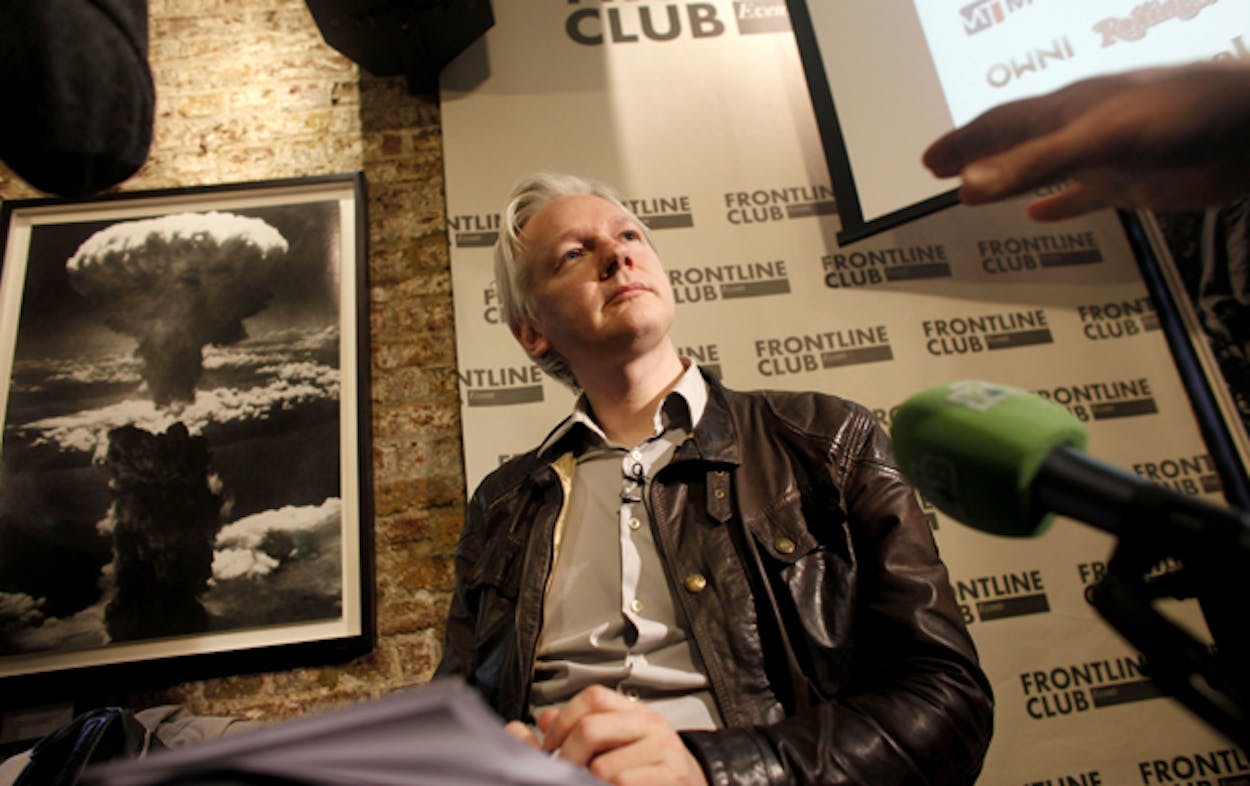Austin-based Stratfor, which had its computers breached in December by the hacktivist collective Anonymous, is now having its internal emails leaked to the world. WikiLeaks began publishing Monday some of the global intelligence firm’s five million stolen communications, which date from 2004 to 2011.
Julian Assange, the founder of WikiLeaks, claimed the emails paint the company’s operating practices in a sinister light. “What we have discovered is a company that is a private intelligence Enron,” Assange told journalists at London’s Frontline Club Monday, according to the Associated Press. “Government and diplomatic sources from around the world give Stratfor advance knowledge of global politics and events in exchange for money,” a WikiLeaks press release says.
In one email from Stratfor CEO George Friedman to a company analyst tasked with obtaining information on the health of Venezuelan President Hugo Chavez, Friedman pushes the analyst to use any means necessary to “take control” of the Israeli informant: “[Y]ou have to take control of him. Control means financial, sexual or psychological control … This is intended to start our conversation on your next phase,” the email says.
Assange also slammed Stratfor for developing a network of paid informants in intelligence and journalism circles and using them to spy for multinational corporations.
Stratfor, however, disputed WikiLeaks’ assessment of its operations, and decried the breach of its email servers. “This is a deplorable, unfortunate — and illegal — breach of privacy,” a Stratfor press release said. “As with last year’s hack, the release of these emails is a direct attack on Stratfor. This is another attempt to silence and intimidate the company, and one we reject … Stratfor will not be silenced and will continue to publish the geopolitical analysis our friends and subscribers have come to rely upon.” The release also cautions that while some of the emails are authentic, others “may be forged or altered to include inaccuracies.”
(Back in 1999, TEXAS MONTHLY‘s Michael Hall profiled Stratfor, which became a go-to source of information during the crisis in Kosovo. During that crisis, Stratfor’s twenty employees were “split conceptually into three groups: ‘Sponges’ troll the Web looking for provocative phenomena, ‘ferrets’ seek out missing information, and ‘foxes’ put it all together.”)
At the Christian Science Monitor, Dan Murphy is unconvinced by WikiLeaks’ stance on Stratfor:
Assange is of the view there’s something dangerous about Statfor. “Here we have a private intelligence firm, relying on informants from the US government, foreign intelligence agencies with questionable reputations and journalists,” he told Reuters. “What is of grave concern is that the targets of this scrutiny are, among others, activist organizations fighting for a just cause.”
I’m not sure what evidence of “activists fighting for a just cause” being “targeted” by Stratfor will emerge from the millions of emails stolen by hackers from the company’s servers (there is evidence that they collected information on Occupy Wall Street protesters but, well, so were lots of journalists). And the first half of that quote on their methods applies to, well, me and any other reporter who’s ever covered international affairs. Over the years, I’ve received information from spies, diplomats, other hacks, and a few really unsavory characters (murderers). If you want information, you go where the information is.
Murphy points out there are many companies that gather information and collect “strategic analysis” for the private sector, and that Stratfor “is on the mild end of the scary shadow CIA/stodgy think tank spectrum.”
The latest leaks are especially troubling to Murphy, as a journalist: “[W]hile Wikileaks presents itself as an anti-secrecy organization, there’s something more than a little ironic about targeting a group that works on … revealing secrets. And from where I sit, it’s not much of a stretch from targeting a group like Stratfor to going after newspapers or academics.”
- More About:
- Politics & Policy







